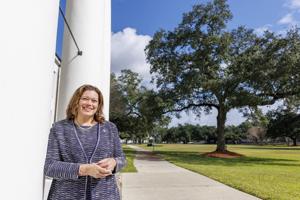Stony Brook University (SBU) is taking significant strides towards sustainability with its dining initiative, SBU Eats, which integrates eco-friendly practices into everyday meal preparation and service. The program focuses on reducing food waste, sourcing local produce, and promoting sustainable dining habits among the campus community, contributing to SBU’s achievement of a STARS 3.0 Silver Rating from the Association for the Advancement of Sustainability in Higher Education (AASHE).
Diana Kubik, executive director of the Auxiliary Services Association, emphasized the importance of sustainability in campus dining. “Food connects us all, and by putting sustainability at the heart of campus dining, we’re helping students build lifelong habits that extend beyond their time at Stony Brook,” she stated. This philosophy reflects SBU Eats’ commitment to fostering a culture of mindful dining.
Innovative Farming and Local Sourcing
One of the standout features of SBU Eats is the introduction of the “Cultivated Cabinet,” a micro-farm initiative launched last spring at East Side Dining. This innovative approach allows students to enjoy ultra-local produce while supporting food transparency and environmental responsibility. A second micro-farm has been established at West Side Dining, producing fresh greens, herbs, and edible flowers just steps away from where they are served.
In addition to cultivating its own produce, SBU Eats actively participates in the New York State Food Product Program, ensuring that meals are prepared with locally sourced ingredients. This not only enhances the freshness of the food served but also bolsters the agricultural economy by supporting local farmers and producers.
Food Recovery and Environmental Impact
In 2024, SBU Eats initiated a food recovery program in collaboration with CareIt, a technology company focused on minimizing food waste and alleviating food insecurity. Through the CareIt mobile app, surplus prepared food from Stony Brook is efficiently matched with local nonprofit organizations, including community groups and churches, for immediate pickup and redistribution. To date, SBU Eats has successfully donated over 4,000 pounds of surplus food to those in need.
SBU Eats is also proactive in tracking its environmental impact. The dining service employs real-time dashboards to measure carbon output, water usage, and waste generated from its operations. By analyzing this data, SBU Eats can develop smarter menus that reduce emissions and encourage the campus community to make environmentally conscious choices.
Promoting Climate-Conscious Dining
The initiative further emphasizes climate-conscious dining through menu labeling. Dishes that meet the low-carbon standards set by the Plant Forward Collaboration are clearly marked, ensuring students can make informed choices. Each of these meals has a total ingredient footprint of no more than 1.9 kgCO2e/kg, contributing to SBU’s overarching sustainability goals.
To combat single-use waste, SBU Eats offers students a complimentary green reusable takeout container as part of their meal plan. This initiative is projected to divert over 2.5 million single-use containers from landfills. Additionally, Roth Café and the SAC Food Court utilize durable, eco-friendly to-go containers made with 40 percent natural materials, which significantly reduces plastic consumption with every meal served.
The Waste Not 2.0 program is another innovative strategy being employed to minimize food waste. This chef-driven tracking tool identifies what is being discarded in the kitchen, enabling culinary teams to implement effective waste prevention measures. By reducing kitchen waste, SBU Eats not only lowers food costs but also advances its sustainability objectives.
Through its comprehensive composting program, SBU Eats collects food preparation waste, which is processed off-site into organic material. This waste is transformed into green energy, nutrient-rich compost, or slurry for wastewater treatment facilities, creating a sustainable cycle that benefits the entire campus.
As SBU Eats continues to implement these initiatives, it remains committed to creating a lasting impact on both the university community and the environment. By promoting sustainable dining practices and local sourcing, Stony Brook University is setting a benchmark for responsible campus dining that inspires students and staff alike to embrace a more sustainable future.


































































